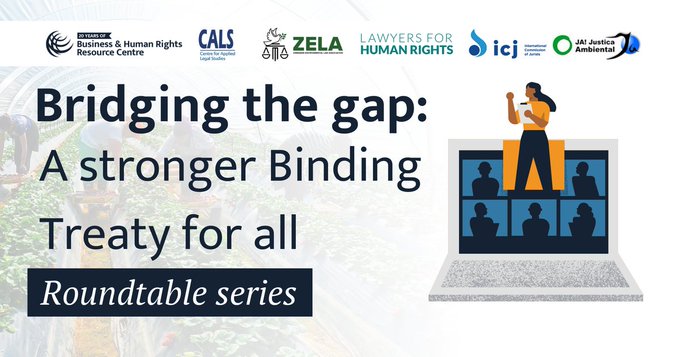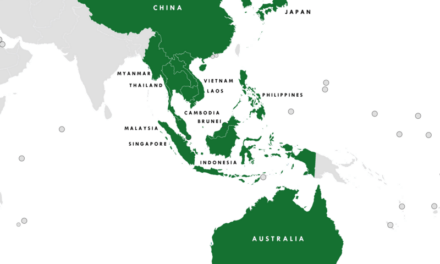
by Joseph Purugganan*
Good afternoon and good evening from the Philippines
Thank you Business and Human Rights Resource Center for organizing this series of roundtables ahead of the 9th negotiating session of the Working Group, and for giving us the opportunity to share perspectives from our region on the necessity and the urgency of a legally binding instrument on transnational corporations.
In 2014, trade and anti-mining campaigners in the Philippines picketed the office of the Department of Foreign Affairs in Manila, to call on our government to support what would become UNHRC Resolution 26/9 mandating the elaboration of an international legally binding instrument to regulate, in international human rights law, the activities of transnational corporations and other business enterprises.
In 2017, together with fellow campaigners from Indonesia, we launched the Asia Task Force on LBI. ATF is envisioned to be the regional articulation of the global campaign for the LBI.
The starting point of this regional articulation is the affirmative votes cast by 6 Asian states— China, India, Pakistan, the Philippines, Vietnam and Indonesia — in support of Resolution 26/9 in June 2014.
The support for the resolution for stronger binding rules for TNCs sent a strong message that States not only recognize that a gap exists in international human rights law with respect to regulating the operations of transnational corporations but that there is an urgent need and perhaps more importantly a commitment on their part to bridge this gap.
Motivations, Context and Dynamics
Indonesia’s support for 26/9 for example could have been motivated by its desire to even the power asymmetry, having been faced with legal claims put forward by huge mining corporations before investment tribunals in the years prior to the UNHRC vote.
An important motivation could be the realization that this one way street where corporations can sue governments challenging regulations and policies affecting their investments but not the other way around. In a statement in 2015, the Indonesian representative referred to the LBI process that was just launched, “a new phase of our common endeavor with regards to human rights protection and promotion.”
Aside from understanding the motivations of States that supported the resolution, sustaining the pressure to continue the process requires a much deeper understanding of the context and dynamics at the national, regional and global levels.
It is important for example to situate the role of Asia in the larger context of global development, especially in light of the pandemic and economic slowdown, and the overwhelming consensus among Asian States to push for corporate driven recovery.
Sustaining the campaign is particularly challenging in Asia for a number of factors:
Asia is at the center of growth and development and a hub of Mega Free Trade and Investment Agreements (RCEP, EU FTAs, IPEF), In Asia economic policies are generally pro-corporate (easing restrictions, providing more incentives, greater investor protection) and the direction of regulations is towards liberalization.
We are also seeing across the region huge negative impacts of corporations on the environment, human rights, and the Impact of abuses on women and gender. All of these violations and abuses are happening alongside the steady rise of corporate power.
There is also the political factor, looking at the impact of elections on States positions vis a vis the UN and the negotiations themselves. As our experience in the Philippines has shown. It was a very different engagement in 2014 compared to 2016-onwards under the Duterte administration- not only in terms of how his administration viewed the issue with regards to corporations and HR, but on the whole UN and what international cooperation and diplomacy, or foreign policy should look like. Including the issue of shifting alliances.
It is important as well to link the LBI and corporate accountability campaigns and other campaigns like those resisting the continuing and re-energized push for trade and investment agreements and so called frameworks for economic cooperation, and issues related to climate and environmental justice. In Asia, the development agenda is underpinned by a continuing adherence to pro-corporate neoliberal development framework.
Furthermore we also need to be mindful of the democracy and human rights challenge in Asia with rising authoritarianism, continuing internal wars, conflicts and counter-insurgency, and the relentless attacks against human rights defenders. We are seeing and documenting continuing cases of HRVs , the growing criminalization of land, environmental and IP rights defenders, and the weaponization of law for example through the use of strategic lawsuits against public participation or SLAPP suits.
So the question of necessity must be viewed from this very challenging vantage point. It is important to examine two interconnected realities: on the one hand you have the reality of the rising number of cases of human rights abuses and violations in Asia happening under authoritarian regimes. And on the other hand you see increasing power of corporations and the corporate capture of economic policies.
Zeroing in on TNCs
The focus on TNCs in the scope of the Treaty , reflected clearly in the mandate of the resolution, and an important demand of the Global Campaign included in its 14 point frontiers for an effective treaty— strikes at the heart of the international legal challenge.
In many cases, the most powerful actors in the entire business operations along the supply chain- the ones that profit the most— often bear the least liability, if they are held to account at all. Most often than not, in fact their very size is their excuse allowing them to downplay their role in the commission of crimes and the harm inflicted on communities. Most often, when faced with cases of abuses and violations TNCs hide behind the nature of business relationships and pass accountability to suppliers and subsidiaries, and the people that run these corporations hide behind the corporate veil.
Take the case of around 60 employees working as drivers and helpers illegally dismissed by Coca Cola Bottlers Philippines or CCBPI. The dismissed workers sought relief from the labor court in the Philippines, the National Labor Relations Commission (NLRC) arguing that they are employees of the Coca Cola Company. The corporation however argued that they are merely contractors, and showed proof of contracts between CCBPI and a company called Concepcion Lines and Freight Services which state that Concepcion Lines will provide hauling and related services to the CCBPI. On the basis of these so called subcontracting agreements, the court ruled in favor of the corporation.
SENTRO, the progressive labor center that supported the case of the dismissed workers, reported that “the workers went up to the Court of Appeals, but were forced to settle since by then their simple cases of illegal dismissal had taken almost 3 years. They got a pittance compared to what they deserve under Philippine law and jurisprudence which is full backwages and reinstatement to their former positions, and they would have had the right to go all the way to the Supreme Court. In the Philippines illegal dismissal cases can go on for up to 7 years or more.”[i]
SENTRO asserts that the only way the workers could have obtained full redress for their grievances would have been to file a case against the Coca-Cola headquarters in Atlanta – if there was an LBI on TNCs.
Another case is that of communities in Koh Kong province in Cambodia documented and supported by the group Equitable Cambodia. “The communities allege that their farms were damaged and their cattle killed as land was cleared to make way for sugarcane plantation under two economic land concessions formed by a consortium of actors including wealthy Cambodian business tycoon, Ly Yong Phat, KSL Group of Thailand, and other smaller stakeholders. In 2010, Tate and Lyle Sugar Corporation received its first shipment of raw sugar from KSL, with which it had signed a five-year contract to purchase all of its sugar output from Cambodia and Laos.”
In 2012, NGO partners lodged a complaint with the OECD national contact point of the United States alleging breaches of the OECD Guidelines for Multinational Enterprises against the parent company of Tate and Lyle, American Sugar Refining Incorporated.
In 2013, NGO partner, Community Legal Education Center (CLEC), contacted an English Law Firm on behalf of affected families in Koh Kong to initiate legal action against Tate and Lyle claiming that the “UK company knew – or should have known – of the allegations against its supplier. They demanded compensation for the value of sugar grown on land they allege still belongs to them. The claim was filed in March 2013. The community entered into settlement discussion with the company in 2015 but after years of negotiations the company refused to pay compensation and instead vowed to “ continue to “use any leverage it had “to ensure the villagers receive financial compensation from KSL and its ex-business partner”.”[ii]
In these cases, the affected communities seek remedy and justice not just from the local perpetrators, but the mother companies – the big brands, the transnational corporations whose business operations depend or are reliant on these services. In the case of Koh kang for example,“ According to an article in the Guardian, “Tate & Lyle, had been exclusive beneficiaries of the sugar produced on the land for a number of years and were involved in the plantation “from an early stage”. They should therefore be held liable for harm done in the course of the business operations.”[iii]
Another important frontier for an effective treaty that is important to underscore is the principle of joint and several liability.
In the document Frontiers of an Effective Binding Treaty, the Global Campaign asserts that “the inclusion of actors up and downstream of the chain is essential to break the logic whereby social, environmental and economic responsibilities are externalized along TNCs’ chains and hidden behind the corporate veil.”
The Global Campaign asserts further that an effective treaty “must set a comprehensive and adequate framework of criminal, civil, and administrative legal liability that must be joint and several. Each and all the parties can be then held individually responsible for the entire obligation, as well as for a portion of it. Overall, joint and several liability along the value chain serves as a mechanism to ensure that all parties involved in a particular human rights and environmental violation are held accountable for any harm caused and that adequate remedy is provided to the affected communities and individuals.”
Complementarity
The question of complementarity of existing mechanisms dealing with business and human rights is an important yet quite challenging issue to discuss .
Do we define complementarity as it relates to jurisdiction like in the case of the International Criminal Court (ICC) where the court can only exercise jurisdiction when national legal systems fail to do so, when it is demonstrated that they are unwilling or unable to genuinely carry out proceedings.
There is an agenda being pushed in the treaty negotiations for this view both in terms of repeated references to the prerogative and supremacy of domestic law, as well as on the question of jurisdiction and the need for an international tribunal. As the Frontiers document asserts:
“Regarding access to jurisdiction, it is essential to reject unconditionally the general principle of forum non- conveniens, and to defend the use of the principle of forum necessitates. The reality on the ground is that communities affected by TNCs violations have barely the resources to pursue legal justice at all, let alone to choose more favourable courts. Forum shopping is typical of TNCs, not of peoples affected by their violations.”
Or do we view complementarity as referring to different but useful when combined? On the issue of seeking corporate accountability, it can be argued that greater accountability can be achieved from a combination of voluntary, mandatory and legally binding instruments and mechanisms. It is important to underscore though that in fact this notion of complementarity of various mechanisms was challenged not by proponents of the treaty but rather by its strongest opponents. Those who opposed Resolution 26/9 and continue to argue against the process are the ones who are pitting these measures against one another. They argue against the necessity and urgency of the LBI by insisting that the LBI process is unnecessary and a waste of time and what is needed instead is to simply make the UNGPs work.
Complementarity should be about seeking the strongest form of accountability and not about settling for less or what is acceptable to business. Complementarity should be viewed from the perspective of affected communities and not businesses.
For example, while the push for mandatory due diligence laws at the national level can be seen as an advancement to the purely voluntary nature of BHR commitments under UNGP, due diligence cannot and should not be the end goal. Accountability should not be a box ticking exercise. Long term goals and outcomes should be accountability and justice for victims and affected communities.
As campaigners pushing for the LBI we say that the treaty is urgent and necessary, and while it is difficult and wrought with many challenges and barriers, it is not impossible, and the openness to discuss ways to strengthen the movement for greater corporate accountability through such forums like these are important steps in hurdling these barriers, confronting the corporate bias, and tilting the balance in international human rights laws in favor of justice for affected communities.
*Presentation at the Roundtable Complementarity of the treaty, NAPs and mHREDD legislation held on 11 July 2023. This is the first roundtable discussion of a 3-part webinar series Bridging the gap: A stronger Binding Treaty for all organized by the Business and Human Rights Resource Center (BHRRC).
Endnotes:
[i] Documentation of the Coca-Cola Bottlers Philippines, Inc. and Concepcion Lines and Freight Services Consolidated illegal dismissal cases by SENTRO.
[ii]Tate & Lyle accused of betraying Cambodia families whose land was allegedly taken article by R. Ratcliffe published in the Guardian newspaper in 2 January 2021. https://www.theguardian.com/business/2021/jan/02/tate-lyle-accused-of-betraying-cambodia-families-whose-land-was-allegedly-taken
[iii] Tate & Lyle accused of betraying Cambodia families whose land was allegedly taken article by R. Ratcliffe published in the Guardian newspaper in 2 January 2021. https://www.theguardian.com/business/2021/jan/02/tate-lyle-accused-of-betraying-cambodia-families-whose-land-was-allegedly-taken







![[IN PHOTOS] In Defense of Human Rights and Dignity Movement (iDEFEND) Mobilization on the fourth State of the Nation Address (SONA) of Ferdinand Marcos, Jr.](https://focusweb.org/wp-content/uploads/2025/07/1-150x150.jpg)

